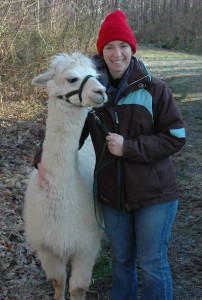Veterinary Freelance Writing: How to Make Extra Money with the Skills You Already Have

 Hi, folks! Elliott asked me to write a short bit on my experiences as a freelance writer in hopes that I may impart some helpful tips for those out there who may be writing and not getting published, or not getting paid, or otherwise not getting where they might want to be. So, here goes.
Hi, folks! Elliott asked me to write a short bit on my experiences as a freelance writer in hopes that I may impart some helpful tips for those out there who may be writing and not getting published, or not getting paid, or otherwise not getting where they might want to be. So, here goes.
I’ve been writing freelance, nonfiction animal/veterinary pieces for (sometimes sporadic) pay for just over ten years. My first paying gig was for a small regional magazine called Rocky Mountain Rider. Although my list of published pieces steadily grows, freelancing is still a hobby for me and I am still a veterinarian first. The freelance business is so capricious; nothing is guaranteed, as publishing houses can and do file for bankruptcy. Such an unpredictable nature makes me inherently nervous and I can’t see myself ever trying to make freelancing my sole source of income. Nevertheless, I enjoy writing. I also enjoy the veterinary profession, so combining the two is extremely fun and rewarding for me.
I’ve always been writing; it is an ingrained habit I’ve had all my life, so the concept of pitching ideas to magazines was sort of the next natural progression. For the first six or seven years of freelancing, my modus operandi was as follows: get an idea, write an article, query some magazines where the article might fit. Sometimes this worked, many other times it didn’t.
Growing up, I read, no, devoured magazines like Horse Illustrated, Dog Fancy, and Cat Fancy. These glossies, with national readership, were the cream of the crop. In order to grow my list of writing credentials, I queried smaller magazines, thinking I had a better chance at getting published in those. I searched through the most current edition of the Writer’s Market to find editor contact information and publications that might like what I had to offer.
What, then, did I have to offer? My first published piece was about the differences in the horse industry between the UK and the US. A general interest piece, it was lighthearted and I imagined an easy fit for a small-time print. So, I wrote the piece, then queried Rocky Mountain Rider. To my surprise, a few weeks later, the editor replied with interest. So, in went the article and I was paid my first writing check: $28.50. I was over the moon. This was in 2002.
 And so it went. I’d think of an idea like: “Ten Tips for Dog Safety in the Water” or “Horse Sense” or “Desensitization: a training approach for puppies,” then I’d write it, then I’d query. If I received a rejection, and I received lots, I’d pick another publication. Slowly, slowly, my list of published works grew, which in turn opened more doors.
And so it went. I’d think of an idea like: “Ten Tips for Dog Safety in the Water” or “Horse Sense” or “Desensitization: a training approach for puppies,” then I’d write it, then I’d query. If I received a rejection, and I received lots, I’d pick another publication. Slowly, slowly, my list of published works grew, which in turn opened more doors.
In terms of pay, it has been all over the place. I have written stuff for free and sometimes still do; whether you do this or not is a personal call and I find greatly depends on the venue. As far as real paychecks, it depends mostly on the size of the readership. For published magazines, a small time print may only offer in the range of $50-200 for say, a 1000 word article. But take a larger, nationally known magazine like Dog Fancy, and you’re looking at $400-$600, depending on the length of the piece. Web-based stuff is much more variable and it can be very hard to gauge what you might get paid, or what is ok to ask for. A general 1000 word piece might catch $100-200 for a small to medium-sized site, but something like wired.com or salon.com I would hope would fetch far more (maybe someday I’ll find out!).
As the internet has grown, the publishing world has changed. This has been both a curse and a blessing for the freelance writer. An almost untold number of websites have sprung up, and a lot of these sites need content writers. The Internet can be a great place for new writers to build credentials, but I also feel the instant gratification of the web can make people sloppy. Evaluate each site critically before submitting stuff. Is this a site you’d want your name tied to? Does the rest of the content seem high quality and reputable?
My writing routine has changed a bit since I first started. Now I pitch an idea to an editor before I actually write it. This is mostly due to the fact that I now write many pieces that include multiple interviews. I don’t want to interview folks if I haven’t already received the green light from an editor. Where do I get my ideas for pitches? Any crazy thing that pops into my brain is fair game. I enjoy the more unique aspects of veterinary medicine and agriculture/animal science and I like to give things a little twist. This then sometimes results in situations where I find myself frying Rocky Mountain Oysters. But, anything for a byline, right?
These days, where “Dr. Google” is the bane of every veterinarian’s (and physician’s) existence, I feel it is more important than ever for veterinarians to write articles for online and print. Too many “pet experts” and “pet lifestyle consultants” are writing pieces on flea control, dental health, and other health topics. Veterinarians who write, I believe, should be a commodity in demand as true experts in the field.
I still get rejection letters. I think this is just the nature of the freelance writing business, no matter if you’re just getting your toes wet, or if you’ve been playing the game a long time. As always, don’t ever give up. Ever. If your writing is solid and the topic is marketable, there is a place for it; it’s just a matter of finding that place. A cool thing to remember is that what is one editor’s trash may be another’s treasure. Plenty of my queries that were rejected by one magazine were picked up by another. Create, write, pitch, repeat. I think the last step is the most important.
Elliott here again: Thank you Anna for sharing your story as a freelance writer!
If you’re interested in connecting further or would like to find more examples of some of Anna’s work, be sure to check out her blog, VetWrite, and follow her on Twitter. I love her regular Vet Word of the Day feature on Twitter especially.
This topic is of special interest to me, because I’ve only ever been paid for two things that I’ve written. I’m hoping to up that count in the near future, and I have a lot to learn from other vets like Anna who are already doing it.
Have you been paid for writing something that utilizes your veterinary expertise? What hints can you share with the rest of us?
Do you have any questions for Anna?


Comments
I certainly recognize Anna’s comment about rejections. I had enough to light a good sized bonfire with my first book. Then I got help with the key phrase in an enquiry letter on the 2nd & third. For instance on the second I wrote “The Trouble WIth Lions is that while conducting a pregnancy check one needs to be equally, if not more, certain about what is going on at the other end” That worked. As for magazines, I wrote about 30 articles for a deer publication. They apporached me, not the other way around. That helps. Good to meet a fellow veterinary scribe, even if only on line. Jerry
Always great to hear from you, Jerry! I hope one day I will be able to look back on as much writing success as you have had!
Hi Anna,
One of the things I find is that in the sciences, we are trained to write a very specific way. I know you mentioned you’ve been writing your whole life, but did you find any significant challenges between the two writing styles, or do you approach freelance writing like scientific writing?
Thank you for the insight!
Hi Vishal,
Great question. You are spot-on about the differences in writing scientifically and writing freelance. I myself do not find it particularly challenging to switch between the two styles. I credit this to the fact that I grew up reading some of the magazines I now write for and therefore I know the “voice” of the magazine. This is very important when you’re looking to break into a certain publication. Reading back issues will help you “hear” how the editors want their writers to sound. I actually have more trouble with scientific writing. I find myself falling into the trap of writing in passive voice simply because it tends to sound more formal. Research abstracts are especially difficult for me. I prefer the colloquialism of the lay publications!
Thanks for reading,
Anna
Hi Anna,
Actually, I appreciated your efforts. One day, I hope that you will be one of the greatest writers who related to the veterinary field. this is wish not only limited to contributions in such a specialized magazines and sites, but also it should be in a very loud voice for the biggest and famous press media. People need a real and natural experiences to read something worth. Lasting inspiration comes from the communication with Media and any other helpful well-spread news agencies. Consequently, the followers will increasing, and the topic would be known. Giving a column, in elite newspaper, like the Guardian, or others could be a breakthrough. I’m not a native speaker, and my English not on the right level right now. I’m looking to have practice writing a niche articles like you about any things i faced in my career. Early job stages, i worked in the field, then i move to the inspection food administration in Jordan. I watched a lot of argued issue linked with consumer foods and health. I wonder if i can put my issues in a place internationally, and try to writing in excellent English as it is an international most used language in the globe. Any way, sorry for my ugly piece; however, my thoughts were briefly translated to bring out a humble opinion between your hands.
To sum up, You open my eyes to very interesting and fertile area to have this amazing transition from tough scientific atmosphere to the widen literacy, full of truth imagination world. Finally, your arrow hit the target directly.
Hello Elliott and Anna,
I, too, have encountered rejection just starting out the gate. So, everyone’s comments have been refreshing, really. I have found that the board certified veterinarians have more entree into this profession; but not every veterinary writer is board certified (Anna is a great example). But, what I have also discovered is that even the best board certified vets get trained in medical writing, which I suppose is more scientific. However, there are not so many of those and the ones that are trained get first dibs on the bounty of work!
There is the American Medical Writer Assoc., the Nat’l Assoc. of Science Writers, Emma Hitt’s 6 week course in medical writing, University of Chicago and Johns Hopkins. There are others…but I think these are resources that I have come upon recently and seem to have open doors for others. At the same time, I appreciate Anna’s expertise and motto to write, pitch and repeat. But most of all, I appreciate her sincerity; I have bumped into what seems to be an elitist group of writers and I hope to show them up one day. After all, we are veterinarians…and we did not get in by giving up!
Thanks for the posting Anna! These are great tips! I am a veterinary technician, and a very new freelance writer.
I am tired of reading articles about pet nutrition, training, and vet care written by “pet experts” who think they can read a book and replace the experience and expertise of a trained veterinary professional. They are perpetuating the spread of misinformation and distrust in veterinarians.
It is nice to know that someone else shares my passion for sharing their knowledge of pet health, so that pet owners can get accurate, helpful information! Great work!
Hi Anna
…..wonderful work…how did you began
Hi Anna — and Elliot!
I’m also a veterinarian who writes.
Fiction: I have two books out, a novel and a collection of short stories. The novel is a veterinary medical thriller called The Keys of Death, about a veterinarian who gets mixed up in a whistle-blowing scheme against a big, bad pharmaceutical company. (Big Pharma is the All Purpose Bad Guy of medical suspense thrillers! 😀 )
The volume of stories is called Startling Figures. They are paranormal stories, like something you might see on Supernatural, or The X-Files.
Non-fiction: I write in-house publications to make my day-to-day life as a practicing vet easier, such as the exciting “Ear Infections” client handout. I also wrote an article on feline nutrition for Cat Fancy.
Here’s a link to The Keys of Death. It looks very clunky when typed out, but it gets you to the amazon page!
http://www.amazon.com/gp/product/B01AVG4Q9I/ref=as_li_qf_sp_asin_il_tl?ie=UTF8&camp=1789&creative=9325&creativeASIN=B01AVG4Q9I&linkCode=as2&tag=clatwal-20&linkId=T45GWSJSPWQIQA7Z
Hello Anna, are you currently doing freelance writing still? I wanted to ask if you’d be interested in a paid writing job for our blog.